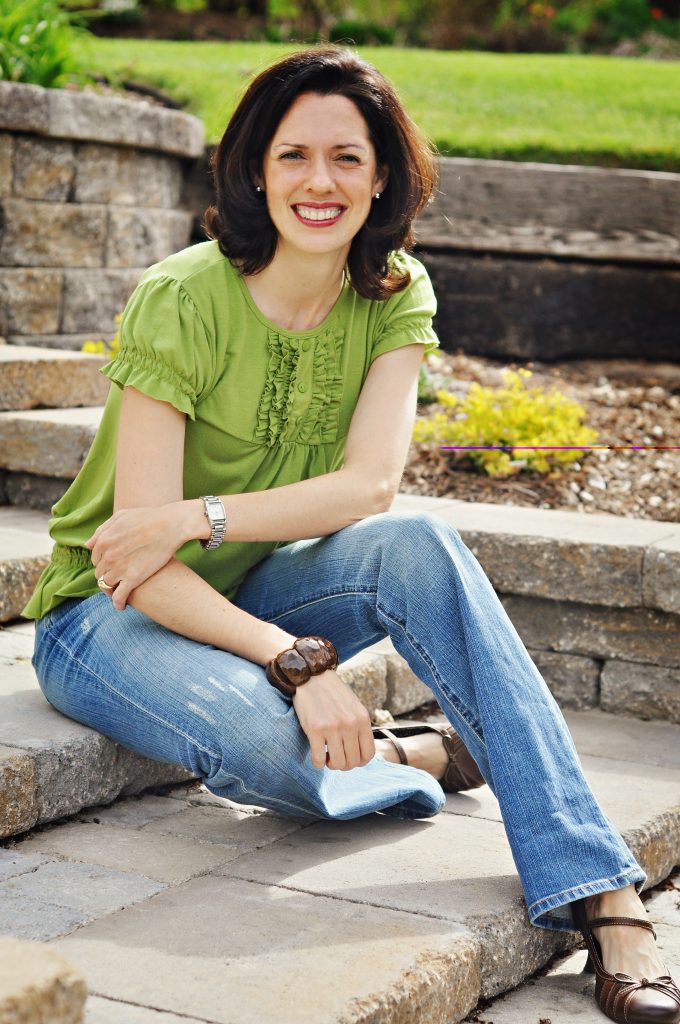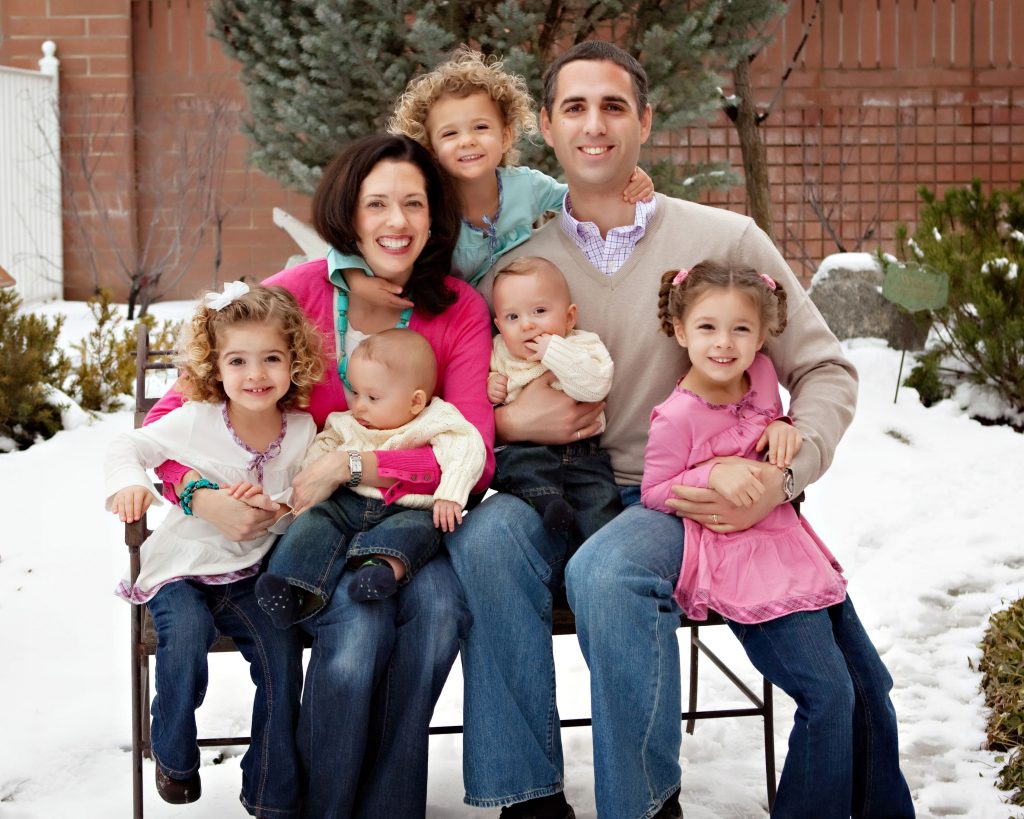May 2010, Salt Lake City, Utah
In four years, Catherine became the mother of five children, including two sets of twins. Catherine recounts her long struggle with infertility and how time in this personal “wilderness” helped her to see motherhood differently. Catherine also shares some of the complexities, joys, and coping strategies that help her live–and love–her busy life as a mother of five under five.
What is the story behind your having five children all under five years old?
My husband, Doug, and I were married in Salt Lake City and moved to Washington D.C. a year and a half later for work. Soon after the move, we decided we wanted to start a family. For six months to a year we tried on our own, but when we didn’t have any luck we went to our obstetrician to get some guidance. From there, we were referred to a great reproductive endocrinologist who did a lot of testing and determined I had high follicle stimulating hormone (FSH), which indicated low ovarian reserve. My egg quality was poor.
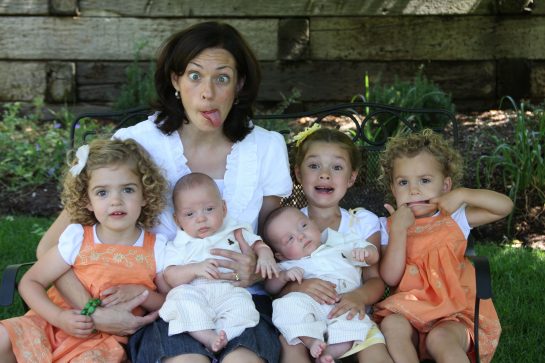
We tried intrauterine insemination (IUI) several times because it’s less invasive than in vitro fertilization (IVF), but it didn’t work. After four years of trying and saving our money for possible IVF cycles, Doug and I were seriously considering two options: we would either adopt or try IVF.
At church one Sunday, someone from LDS Family Services spoke about adoption. I was so emotional. We watched a movie about birth moms and what it takes for them to give up their babies and how many children need to be adopted. I was a blathering mess. After this experience, Doug and I did a lot of praying and finally felt IVF was the right route.
Our first IVF didn’t provide great odds but we ended up with one good embryo from the eight embryos doctors were able to harvest. Two of those were implanted, and the good one took. That’s how we got our oldest daughter, Eliza.
As we thought about how we would pay for another IVF treatment, a divine thing happened. The company my husband worked for changed healthcare plans to create an umbrella for infertility. This meant we went from needing to save $10,000 to having the treatment covered 100 percent, without a penny out-of-pocket.
At this time, Eliza was only nine months old. We knew, however, that we wanted to take advantage of this insurance plan while it was still available, so I weaned her and we tried another IVF treatment when she was a little less than a year old. This was a better cycle, with two viable embryos. Both were implanted, and we knew there was a 50 percent chance both would take. We weren’t sure if Eliza would be our only child. If so, we would be fine — but if we could get twins out of this round, we would be thrilled. Everything worked out, and our twin girls, Alexandra and Samantha, were born.
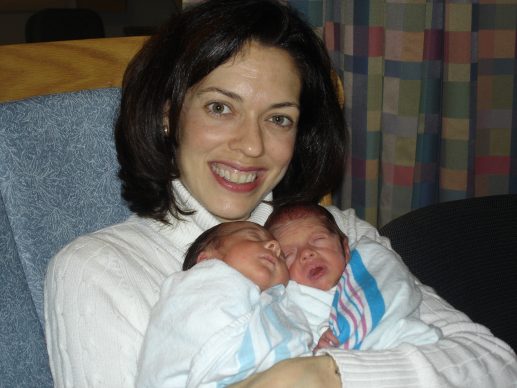
The girls came almost two months early. Eliza was nineteen months old. This was a huge surprise and, actually, a very scary experience. The day they were born I had not felt well. I had vomited a couple of times and had a relentless headache that I couldn’t get over. I wasn’t sure what was wrong, so I called our physician and he asked me to go the hospital for monitoring. Just as I was pressing the elevator button for the labor and delivery door to open, I had an eclamptic seizure. In just twenty-four hours, I went from having normal blood pressure to such high blood pressure that it affected the brain and sent me into a full-blown seizure.
Doug and I happened to be just twenty feet from the operating room, so the nurses came rushing and took me to the O.R. for a crash C-section. Luckily a physician was there who had been at the hospital longer than expected; he was just putting on his coat to head out. He went right back in and started my C-section. Both placentas abrupted during the seizure, so both babies were blue and had to be resuscitated.
Had we been anywhere else, the babies would never have made it, and I may not have made it, either. Our physician lived only five minutes away and arrived in time to deliver the babies and finish the surgery. When he came out of the O.R. to talk to Doug, his shirt was covered in blood and he said, “That is the first time I’ve delivered babies in my street clothes.”
I feel like the conception as well as the delivery of these two babies was a miraculous thing. We felt so grateful. While I was in the hospital recovering, my dad sent me a verse of scripture from the Old Testament. “He who watches over Israel neither slumbers nor sleeps.” Psalm 121:4. The Lord was so vigilant in ways we could never have foreseen. Everything was in place for us to have those little girls.
What caused you to want more children after such a frightening experience?
Doug was ready before I was to try for more children. The first year of our girls’ lives had been so exhausting. We were in Virginia without family. And although we had a wonderful ward that we couldn’t have done it without, the grunt of a mother’s work belongs to the mother. We are the caregivers. At the same time, Doug’s work was very demanding and often required him to work evenings and Saturdays. He was also serving as a counselor in the bishopric – so he was gone much of the time. I wasn’t quite ready for another baby, but we look back now and know we were prompted to move ahead.
During those months of deliberation, we made an unexpected decision to move back to Salt Lake City. We had been in Virginia almost eight years and thought it would be our home for a long time but an opportunity in Salt Lake presented itself and we felt urged to make the move.
I knew I did not want to start over with the fertility process. If we were going to have more children, I wanted to use our fertility doctor in D.C. When we approached the doctor about another round of IVF, he said that, considering what happened with our girl twins (who are fraternal), he would only implant one embryo. We were fine with that. I had done the twin thing. I did not need to do it again.
When the doctor did the transfer this time, Doug had a strong impression it would be a boy. Usually the physicians are very technical and use the term embryo, not baby. But this time he said, “We are going to place the baby right here.” Hearing those words made it seem real and within reach that the process might work another time. Only a few weeks before moving, we had a positive pregnancy test.
At nine weeks gestation, I had an ultrasound, and sure enough, just one baby was growing. That’s what we had planned on. Then, at about fifteen weeks, I had some bleeding and was worried I might be losing the baby. When I went in for another ultrasound, I saw two round circles on the screen that looked like heads – the exact image I had seen with Ali and Sami. I almost stopped breathing. The tech said, “Are you aware that there are two babies in there?” My response was, “No. There cannot be. No. There is no possible way! We only put in one embryo. There cannot be two babies!”
How did you come to terms with God’s will for you?
Initially, news of another set of twins was shocking. I didn’t accept it right away. While staring at the ultrasound screen I got cold and my limbs begin to shake. It felt like the fight or flight syndrome was in full swing. I thought, How can I do this? How am I going to meet the needs of two more babies?
While waiting to see the doctor, I called Doug and told him we were having identical twins. There was silence.
Then he said, “What did you just say?” I repeated our news and he said, “No way. There’s no way. Really?” I laughed (or I was going to cry) and said, “Yes! I saw them, they’re in there. That one embryo split!”
He answered with excitement, “That is awesome!” I oozed into my chair and said, “Really, you think that’s awesome?” And he said, “Of course. What are the chances? This is the Lord. He’s working in our lives.”
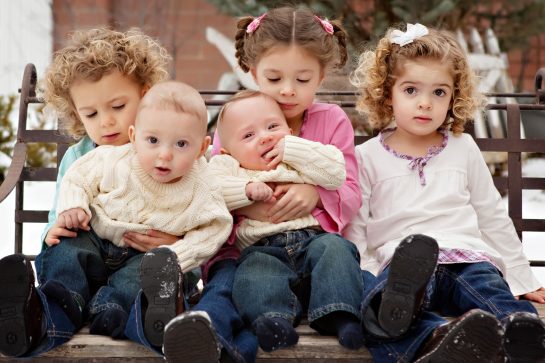
It was Doug’s expression of faith—in that moment–that made me realize this was completely divine and in God’s hands. Hearing him say it would be okay and we could do it again was exactly what I needed.
Within minutes, I too began to realize how amazing this really was. Occasionally, Doug would remind me that my patriarchal blessing says I will have sons and daughters. I always reconciled that by thinking I would have sons-in-law. But sure enough, we had sons.
What are some of the realities of your day-to-day life?
My days involve tons of multi-tasking. I feel like there’s never a break. I rush from one need to the next, probably because my children are at such young, needy ages. Some days I feel like all I do is change diapers—we have four in diapers—and wipe noses. In the middle of that, I try to nurse babies and make dinner. It was after the boys turned six months old that I pulled out a new set of pans my husband had given me for Mother’s Day. I looked at them and thought, cooking–what is that? I haven’t done this in a long time, but, wow new pans – you look so nice.
A couple of nights ago, I had dinner on the stove while I was bathing the boys one at a time in the kitchen sink. In the midst of turning to stir the noodles and then bathe a baby, I had the girls on the back porch playing. I could see they had found water coming out of the drainpipe, were filling up cups and making mud pies. I couldn’t really intervene because I had a hot stove and a baby in our sink. Before long, the girls ran into the house covered in mud, rushing to make it to the bathroom. The twin girls are potty training, so they ran to the toilet and started calling for me. They had to sit and wait. Someone is always waiting in our house.
It’s a really housebound time, and it’s hard to even step outside with all the kids. We rarely load everyone in the car and go somewhere. Since the boys were born, all of us together have been to church, my mother’s house, and my mother-in-law’s house. That’s it.
As a mother, what are some of your coping strategies?
As a product of our circumstances, I’m trying to live in the now and enjoy and soak up as much as I can. I promised myself that because we went so long without children, and I knew what a gift they were—even though they did come all at the same time—that I would not complain. I knew it would be hard, and I do sometimes find myself complaining about the logistics (I never have enough hands) but not in my heart because I know it’s such a blessing and honor to be a mother.
I’m already feeling the brevity of this time. I can see that this season doesn’t last very long. Soon the kids will be grown and through these phases where they are so needy. I’m trying to enjoy the moment as much as I can.
I take a lot of pictures and try to see things through my children’s eyes. Writing about our life also keeps me sane. I blog, which is a great outlet when my life right now is so insular. I’m not meeting with many people face-to-face, so it’s a way for me to connect. Plus, writing things down helps me see situations in a more humorous light. I also want to capture the feelings I have right now. If I don’t, I’m afraid it will be gone, a blur, and I won’t remember at all.
My children are learning independence – probably earlier than they would have otherwise. I have to let them do things for themselves and each other. Like getting dressed, even if the outfit clashes horribly, doing their own hair, or making a peanut butter-jelly sandwich. This usually means more messes but I’m getting okay with that. My twin girls have basically potty-trained themselves – with assistance from their big sister. And all three of them have learned how to help me with things around the house. They empty the dishwasher, take out the garbage, help me gather and sort laundry, clean up toys, assist with meal prep (Eliza is a great potato peeler). Things aren’t always done my way, but I’m grateful for their help.
A few nights ago I heard Eliza in the hallway saying, “Hold still. I’ve almost got it.” There she was, kneeling on the floor, trying to put Sami’s diaper on for me. I asked her to help Sami find the diaper box but she went the extra mile by trying to put it on (something she’s never done before) – because I was in the middle of changing the boys. Moments like that fill me with love for my children and help me embrace our circumstances.
All this independence, however, can sometimes lead to unsupervised disasters. Yesterday, the kids unraveled an entire roll of toilet paper, tore it into tiny pieces, then sprayed down the laundry room, and themselves, with OxiClean. These kinds of things can make me so crazy, but I have to see it through my children’s eyes. They’re exploring, and I try not to get frustrated.
I can also tell when I’m maxed out and need to leave the house. When these times come, I get a babysitter and do something for myself. I like to meet a friend for lunch or sit at Barnes and Noble and read.
How do you find the time to renew yourself?
It’s hard to carve out time to feed myself spiritually. I admit there are times I don’t feel very spiritual or in-tune. Life has been so intense. In the days when the boys were new, I would often get ready for bed and realize I hadn’t even looked in the mirror or brushed my teeth all day. During that time, I was praying, but good scripture study was nonexistent.
Lately, I’m in a better routine. It helps if I get up early to read the scriptures, and I always read before bed. I tend to sacrifice sleep to feed my soul. Maybe that’s not the best thing, but when everyone’s in bed and it’s finally quiet, I feel such a need to renew myself.
I’ve been thinking a lot about this time when it’s common for young mothers to feel spiritually barren. We’re in our own little wilderness. A good friend of mine keeps a letter in her scriptures that her mother gave her before she went on her mission. She wrote, “Like Alma, John the Baptist and all the other recobites, you will be out in the wilderness. But that is where all the fiery things happen. It is where God likes to come.” I love that idea. Even though this is such an intense time, He does not forsake us—even when we can’t be as spiritually committed as we’d like and when our spiritual study isn’t what we want it to be.
My heart is there. I want to give my spirit the time. I want to be diligent, but I’m doing the best I can. I have to trust that’s enough. And when I look back, I think I’ll see that He really does visit in those times. He’s a part of it. He’s there. He’s handling my life even when I don’t see and feel it.
How did the years of infertility change your perspective on motherhood?
It made me much more grateful for the privilege of being a mother. During the difficult years before children, I read everything in the scriptures about waiting on the Lord. There had been promises made in my patriarchal blessing, and in other blessings I had received, that I would eventually be a mother. The long wait made motherhood that much sweeter, and I knew I never wanted to take it for granted.
In thinking again about the wilderness analogy, there must be opposition in our lives. When people go through that wilderness and finally receive the gift they’ve been waiting so long for, the drinking from the well is that much sweeter. You can drink much more deeply because you’ve been without for so long.
My wilderness made me grateful. Because of it, I never want to be distracted as a mother. I want to funnel all of my knowledge and energy into mothering. I want to give all I have to these children.
How can mothers focus on enjoying rather than surviving motherhood?
I can relate to survival mode, the feeling of being the mommy martyr – feeling like you’re not getting out, you’re not doing anything for yourself – you’re stuck meeting needs that seem so basic.
I am enjoying motherhood, and for me slowing down is key. As the mother of twins, I have to multitask. At the same time, I have to resist the temptation to, for example, read all the kids a quick story and shuffle them off to bed. It’s helped to find time with each child individually. I have to stop myself and take those one-on-one moments to have a small conversation with a child or wrap a little one in my arms and give them a hug, or snuggle with them at night. When these opportunities present themselves, it’s so easy to hurry past them. However, when I can tell a child needs that one-on-one time, I probably need it too, maybe even more than they do. When I stop, I’m filled. It only takes two minutes. I don’t know why I’m in such a hurry to move on to the next meal, nap, or whatever it is.
Another helpful strategy is a shift in thinking about housework, feedings, cooking, and laundry as drudgery. Julie Beck once said it’s just as much an honor to feed and nurture your children physically as it is spiritually. I also love the proverb, “Work is love made visible.” When we are working in the home for our families, it’s all out of love. We made the choice to be mothers and we are motivated by love. Letting that mentality flow out of us and into the work that we’re doing can keep us from being frustrated by the daily chores – the tasks that are constantly undone.
I actually love that my children are all smooshed together. Although it’s fast and furious right now, and will probably always be that way, I think they will be good friends, as they experience the same phases of life together. They are lucky to have each other. And it’s a privilege to be their mom.
At A Glance
Catherine Arveseth
 Location: Salt Lake City, UT
Location: Salt Lake City, UT
Age: 35
Marital status: Married 10 years
Children: Five – Eliza (4), Samantha & Alexandra (3), Spencer & Gordon (10 months)
Occupation: Exercise Physiologist, Freelance Writer
Schools Attended: University of Utah – BS (Exercise Science), English Minor
Favorite Hymn: “Abide With Me”
Current Church Calling: Relief Society Teacher
On The Web: http://dcarvys.blogspot.com/
Interview by Melissa Hardy. Photos by Katrina Anderson.
At A Glance

